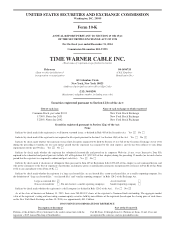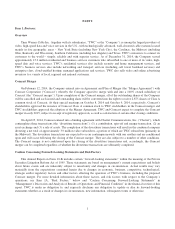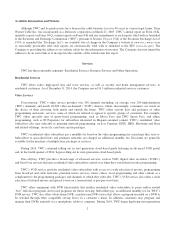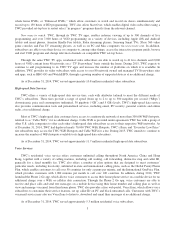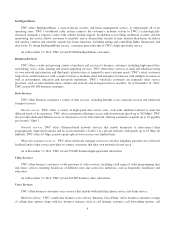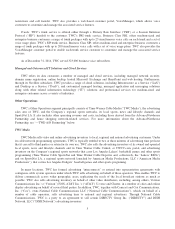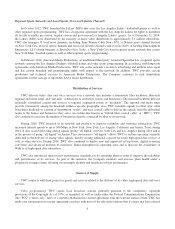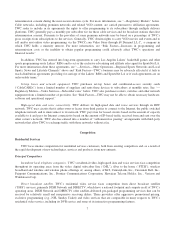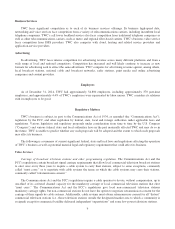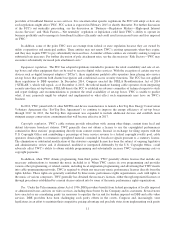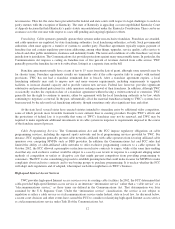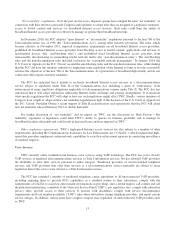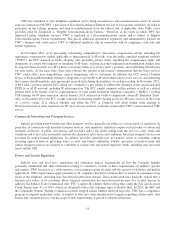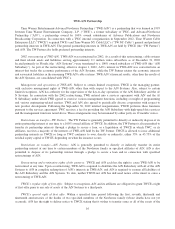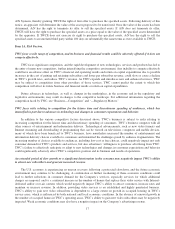Time Warner Cable 2014 Annual Report Download - page 16
Download and view the complete annual report
Please find page 16 of the 2014 Time Warner Cable annual report below. You can navigate through the pages in the report by either clicking on the pages listed below, or by using the keyword search tool below to find specific information within the annual report.In some areas, incumbent local telephone companies and DBS operators have entered into co-marketing
arrangements that allow the telephone companies to offer synthetic bundles (i.e., video service provided principally by the
DBS operator, and DSL, wireline phone service and, in some cases, wireless service provided by the telephone company).
From a consumer standpoint, the synthetic bundles appear similar to TWC’s bundles. DISH Network also directly offers
satellite-delivered broadband service under the name dishNET. In May 2014, AT&T announced its agreement with
DIRECTV to acquire DIRECTV.
Overbuilders. In some of TWC’s operating areas, other operators have built systems and offer video, high-speed
data and voice services in competition with TWC. For example, in Kansas City, TWC’s residential video and high-speed
data services compete with Google Inc.’s (“Google”) video and broadband services, and Google has announced its
intention to launch video and broadband service in other TWC operating areas during 2015. In addition to Google, others,
including RCN Telecom Services, LLC and WideOpenWest Finance, LLC (“WOW”), have overbuilt in parts of the
Company’s operating areas.
Other Competition and Competitive Factors
Aside from competing with the video, high-speed data and voice services offered by incumbent local telephone
companies, DBS providers and overbuilders, each of TWC’s residential services also faces competition from other
companies that provide services on a stand-alone basis.
Video competition. TWC’s residential video service faces competition from a number of different sources, including
companies that deliver movies, television shows and other video programming over broadband Internet connections to
TVs, computers, tablets and mobile devices, such as Hulu.com, Apple Inc.’s “iTunes,” Amazon.com Inc.’s “Prime,”
Netflix Inc.’s “Watch Instantly,” Google’s “YouTube,” DIRECTV’s “Yaveo” and DISH Network’s “Sling TV.”
Increasingly, content owners are utilizing Internet-based delivery of content directly to consumers, some without charging
a fee for access to the content.
Internet competition. TWC’s residential high-speed data service faces competition from a variety of companies that
offer other forms of online services, including wireless and satellite-based broadband services.
Voice competition. TWC’s residential voice service competes with wireline, wireless and “over-the-top” phone
providers. An increasing number of homes in the U.S. are replacing their traditional wireline telephone service with
wireless phone service, a trend commonly referred to as “wireless substitution.” Wireless phone providers are encouraging
this trend with aggressive marketing and the launch of wireless products targeted for home use. TWC also competes with
“over-the-top” providers, such as Vonage, Skype, magicJack, Google Voice and Ooma, Inc. and companies that sell
phone cards at a cost per minute for both national and international service. In addition, TWC’s residential voice service
competes with other forms of communication, such as text messaging on cellular phones, instant messaging, social
networking services, video conferencing and email. The increase in wireless substitution, the number of different
technologies capable of carrying voice services and the number of alternative communication options available to
customers have intensified the competitive environment in which TWC operates its residential voice service.
Security and home management competition. TWC’s IntelligentHome service faces competition from traditional
security companies, such as The ADT Corporation, service providers such as Verizon, AT&T and DIRECTV, as well as
new entrants, such as Alarm.com, Inc. and NEST Labs, Inc. (which Google acquired in 2014).
Additional competition. In addition to multi-channel video providers, cable systems compete with all other sources
of news, information and entertainment, including over-the-air television broadcast reception, live events, movie theaters
and the Internet. To the extent that TWC’s services converge with theirs, TWC competes with the manufacturers of
consumer electronics products. For instance, TWC’s DVR service competes with similar services on devices
manufactured by consumer electronics companies.
8



